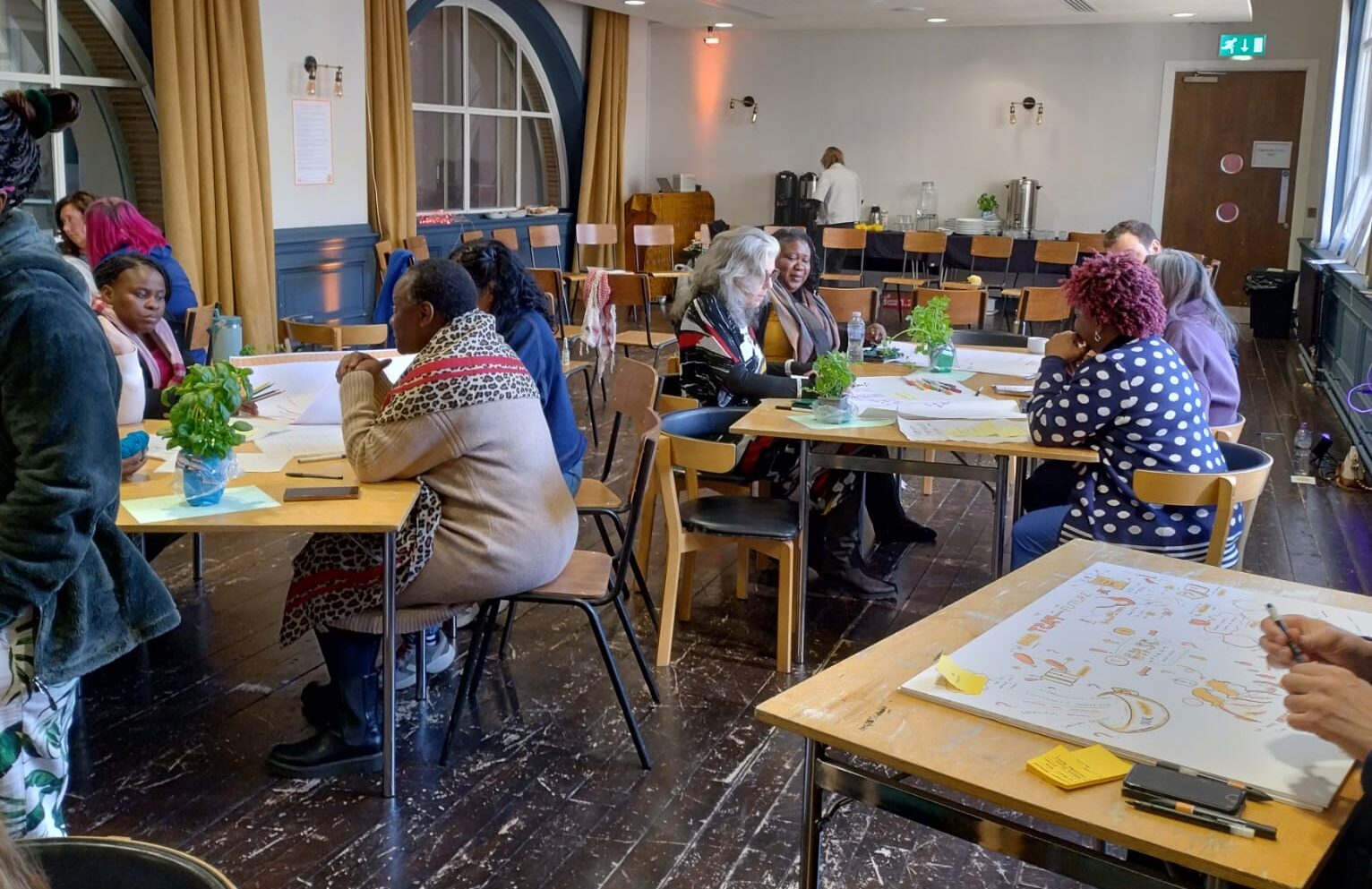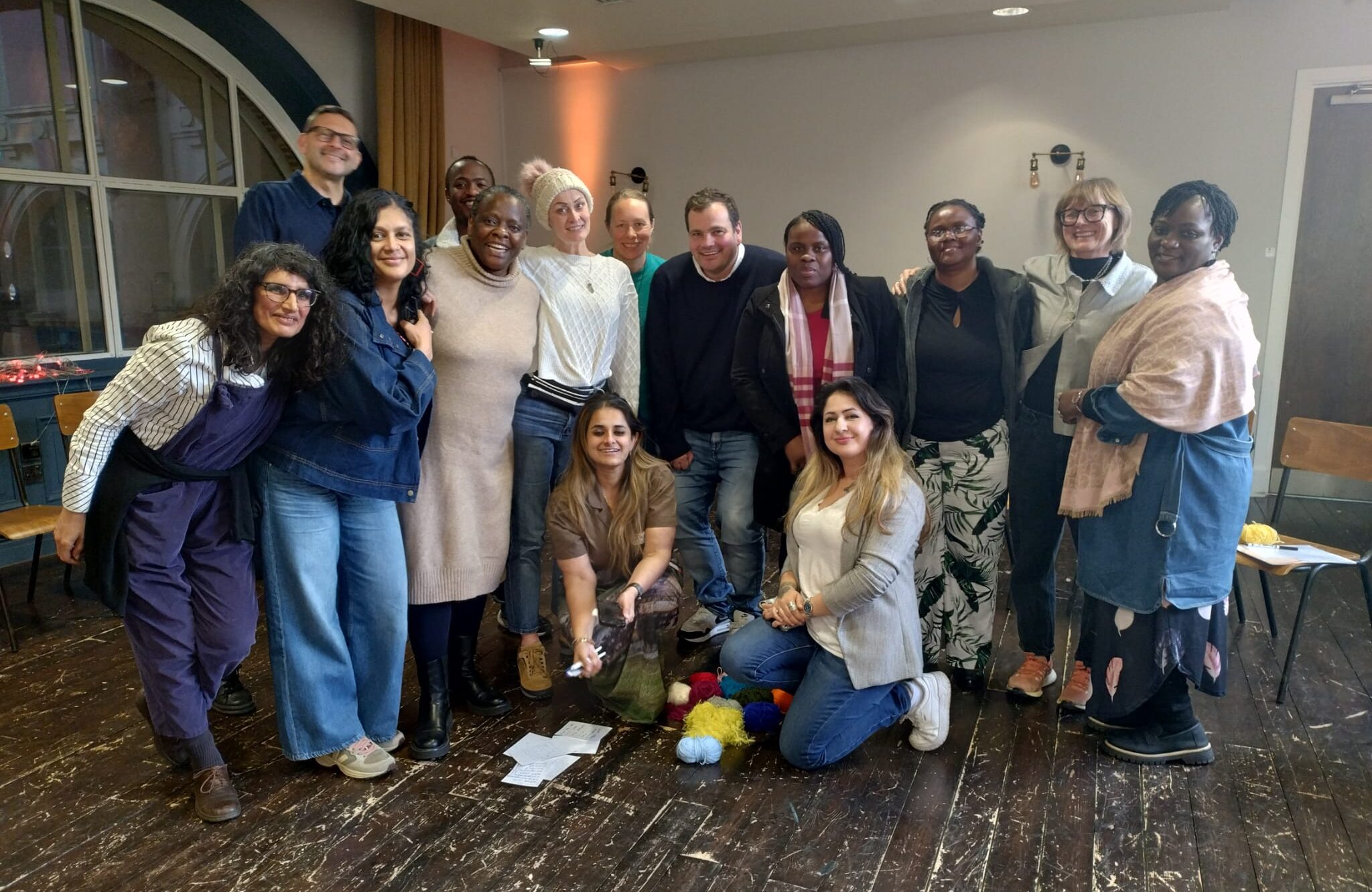
Last autumn, we held the first wave of GM SC Forums to gather partners’ views on the future of GM SC. This information was compiled in the report Seeds of Our Future. This month, we gathered again, went through the report together, and dug deeper to make decisions about our potential collective future.
On the 6th of March, we met again in person, with the partners who were both interested and available. We held World Café discussions to surface priorities, values, and structural possibilities for the network, including how GM SC should be structured, governed and resourced. Partners emphasised the importance of collectivity and liberation, to ensure that GM SC’s future structures, decision-making processes and spaces, will be open, transparent, and accessible to all who share GM SC’s values. Discussions also explored alternative economic models, shared resources, community-owned spaces, and the possibility of building alternative systems beyond capitalism and institutional constraints.
The second part of these discussions was held online on the 13th of March, for the partners who couldn’t make it on the 6th. They built upon the themes discussed the week prior, emphasising the need for prioritising redistributing wealth, collective ownership, and shifting away from scarcity-driven mindsets. They also discussed the importance of creating trust-based ways of existing together, reducing competition for resources, and fostering collaboration across communities. There were also deep discussions on learning and unlearning, valuing contributions beyond money, and embedding care, rest, and well-being into the future of GM SC.
Based on our discussions, we also attempted to identify the questions that we would need to consider the following week. It is likely we will not be able to go through all of them at once, but they will be useful as a starting point. The key themes and questions captured on each day are below, to provide a foundation for the next step, and an opportunity for everyone to catch up on what happened at each forum.
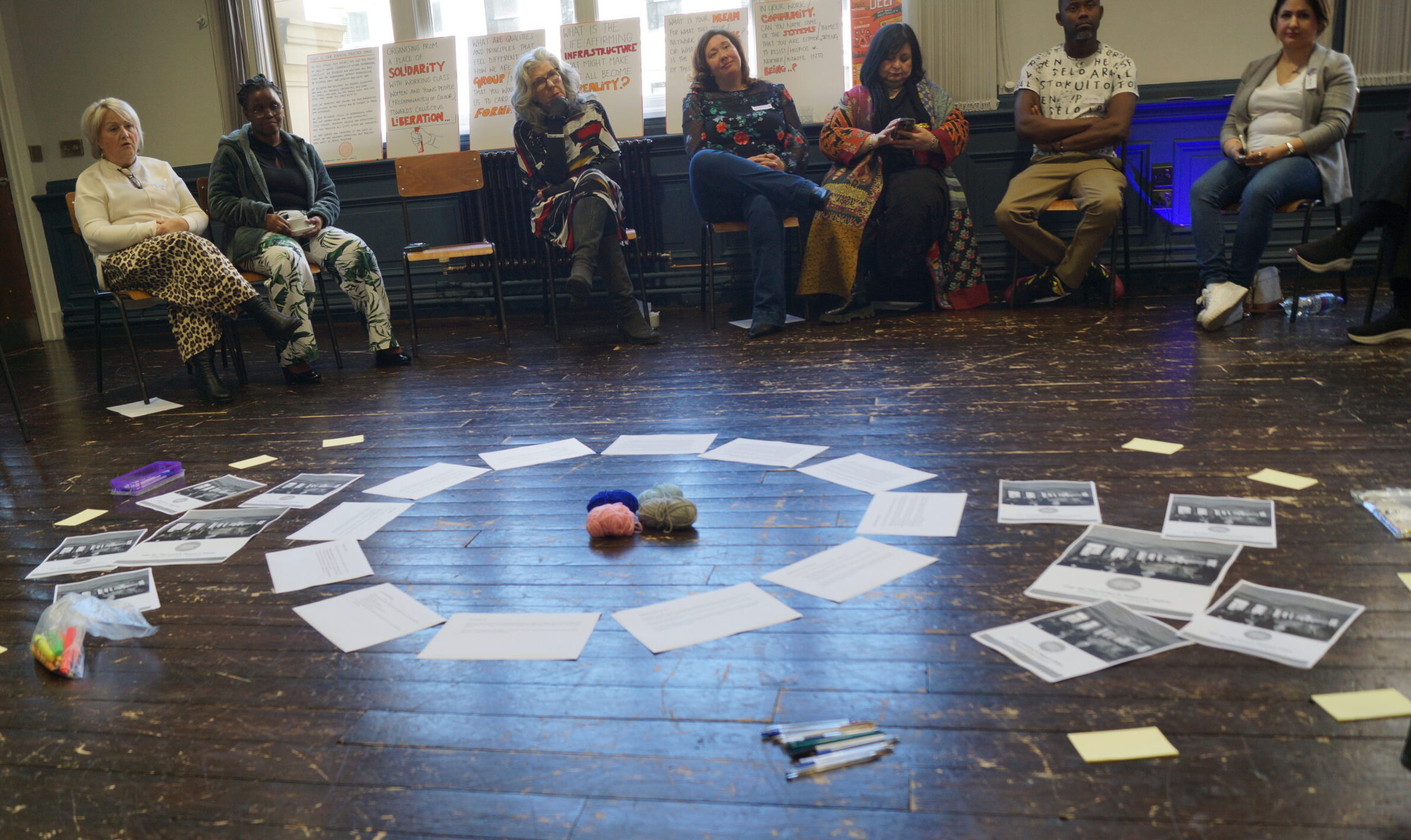
GMSC forums: key points and questions from the 6th of March
On the 6th of March 2025, partners decided to have discussions related to the future of GM SC, around the following 5 tables for the World Café: Gather and organise (central hub), Healing money, Community ownership, Building alternative systems, and Structure Entity. Following those discussions, the below themes repeatedly came up during the conversations:
Collectivity and liberation. Partners wanted to make sure that GM SC’s future structures, decision-making processes and spaces, will be open, transparent, and accessible to all who share GM SC’s values. There was emphasis for those to be designed to include people who have historically been excluded by mainstream systems, which luckily for us is the current membership of GM SC. Partners also wanted to learn and unlearn together, dismantle systems of oppression, and foster accountability in ways that distribute power rather than centralise it.
Alternative economic models and resource-sharing. Partner discussed the importance of community-controlled wealth, ethical funding, and reducing reliance on exploitative financial systems for the future of GM SC. They raised ideas of a collective financial pot, a circular economy, and valuing skills as currency. There was strong support for prioritising economic justice and ensuring that our future financial strategies reflect the GM SC’s values.
Structure and governance. Partners want to maintain a balance between flexibility and stability in terms of the future structure and governance of GM SC. There was agreement on the need for some form of organised framework to support the work, but discussions over whether or not we wanted distributed leadership, rotating roles, and/or a space for people to participate at different levels. There was a preference for models that allow agility and accountability without replicating traditional hierarchical systems.
Community-owned spaces. Partners were interested in GM SC using physical or virtual spaces or a combination of both in the future. There were discussions between centralising it in one place owned by GM SC, and using or co-owning existing spaces across different locations/boroughs, ensuring they operative following GM SC’s anti-oppressive values and enable participation from a wide range of people. The conversation extended to land and housing, with a desire to build sustainable, community-led alternatives to privatised ownership.
Building alternative systems. Partners were interested in GM SC building alternative systems beyond the constraints of capitalism and current institutional structures. They explored ways to transition into different ways of organising, supporting one another, and addressing fundamental needs like food, housing, and financial stability. Some people were interested in reforming existing systems, others were more interested in experimenting with new models that center healing, justice, and liberation.
Overall, the discussions showed a commitment to collective decision-making, liberation and social justice, and long-term sustainability while ensuring flexibility. Below are the notes and questions from the 5 rounds of World Café. Please note that the notes and questions do not reflect the views of everyone involved in GM SC, they are simply things that have emerged from collective discussions.
-
Gather and organise (central hub)
Key points:
ROUND 1
- Different orgs with different missions BUT remain entirely inclusive, transparent & and collective
- No more hard-to-reach or hidden people
- A space to learn how to challenge
- Accountability framework
- Accessibility: A space to learn how to change ourselves and systems of oppression
ROUND 2
- Practicing learning & unlearning
- Commitment to healing, justice & liberation
- Across places & spaces
- Gathering to share knowledge
ROUND 3
- A yearly retreat/conference (in Tenerife!)
- Cross-fertilisation: Human capital & library of knowledge/wisdom (online)
- Resource & radical direction of knowledge
- Online training (code, tech, and unlearning)
- Being reactive to campaigns – solidarity to/with other campaigns
ROUND 4
- Start with who is already involved, build from there
- Make sure we all know what each other does & can bring
- Choose what we can commit to (time, resources) & share it
- We need some level of organisation but distributed, not centralised
- Commitments equalise power in an ongoing way
- Find out what the asks & offers are & work out how best to share resources
- People need pathways to come in & help to get up to speed
ROUND 5
- Have a shared purpose and statement (e.g., what we do & why)
- Common values that we all share
- Using all our languages and ways of existing, organising & expressing through stories
- A space that has a great vibe for play & joy
- A safe place
- Practicing community ownership that is sustainable
- A children’s version of GMSC that is part of the GMSC
- A better model of childcare that enables carers of children to fully engage
-
Questions, organised by themes:
-
Identity & purpose
- Do we want to have a shared purpose and statement of what we do and why?
- Do we need clear shared values?
- Do we want to agree on common values?
- Do we need specific commitments?
- Do we want to be liberators?
- Do we want to be oppressors?
- Do we want to be intentionally inclusive?
- Do we want to include everyone who is missing?
- Do we want to give people what they want?
- Do we want to do what we want?
- Do we want to be ‘leaders of change’?
-
Membership
- Do we want to stay in the same membership?
- Do we want to expand the membership to different people?
- Do we need to define what membership includes/involves?
- Do we start with who is already involved so we can build from here?
-
Structure
- Do we need dedicated time to put together the scaffold of GM SC in its future form?
- Do we want to be a central hub?
- Do we think a central hub is enough?
- Do we need multiple hubs in multiple locations?
- Do we need an expenses & travel fund?
- Do we want to practice community ownership that is sustainable?
- Do we want to self-organise around needs and offers to support each other?
-
Gatherings
- Do we want a yearly retreat/conference?
- Do we want to have yearly gatherings?
- Do we want to create a space to play and enjoy?
- Do we want to create a safe space?
- Do we want a space that prioritise having a great vibe?
-
Learning & Unlearning
- Do we want an (online) library & resource of knowledge?
- Do we want to do training (online)?
- Do we want to use different languages and ways of existing?
- Do we want to express all our languages and ways of existing, organising & expressing through stories?
-
Campaigning
- Do we want to support external campaigns?
- Do we want to decide what those campaigns are?
- Do we want to know about other campaigns?
- Do we need a community organiser?
- [Do we want to run campaigns?]
-
Including children members
- Do we want a children’s version of GM SC as part of GM SC?
- Do we want a better model of childcare that enables carers to fully engage?
-
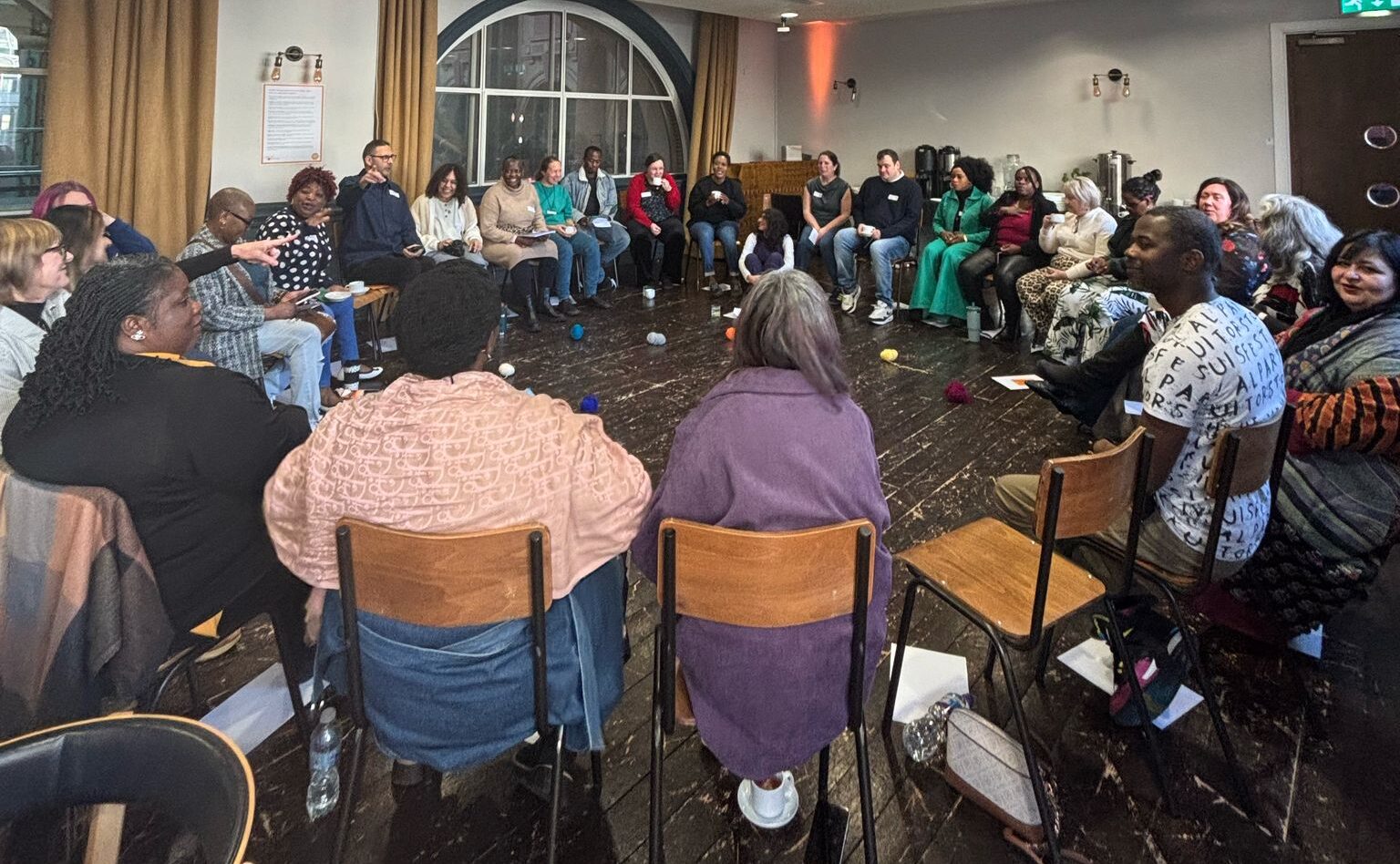
Healing money
Key points:
ROUND 1
- Alternative ways of funding what’s needed such as:
- Diversify the resources
- We control the ways of delivering
- We are permanently accountable for how we grow and distribute the wealth
- Building community wealth that we own (not necessarily a building). E.g. The community donates to a bank . A loan without interest NOT a credit union
- Create employment where our members’ skills are paid for and those monies go into a collective pot.
ROUND 2
- We collectively own and share resources ( including non financial).
- The money could go into a central pot and be shared based on need (money pile).
- The money could move between us e.g. a circular economy , mass buy and distribute, accountancy etc.
- We have multiple ways of functioning, allowing different strategies.
ROUND 3
- Need to be rooted in economic justice before and healing.
- Understanding of individual relationships with money.
- Commitment to the vision
- Partnerships with other wealth holders and others doing similar work. e.g Ubele, P2P, BLDGiving, Justice funders.
- Thinking of the 3 streams:
- GMSC distributing to grassroots orgs
- Non-investing (non exploitative, extractive) neighbourhood transformation
- Collective pot of mutual aid.
ROUND 4
- Engage ethical funders that share our values.
- Building a GM economy where resources evolve to become self-sufficient.
- Internal philanthropy.
- Safeguard the model from government take-over.
- Money to sustain and support communities .
- Healing money, transitioning into an alternative.
- The balance and relationships between money and skills.
ROUND 5
- Entrepreneurship and young enterprise.
- Bartering economy.
- Create a community chest of resources of food chest , money chest, technology chest, skills chest, etc. What you take out you replace (flexible timeline) and add more. (Inspired by the game Monopoly to become Comopoly!)
C- Community
H- Hope
E- Empowerment
S- Strength (or solidarity?)
T- Transformation
Questions, reorganised by themes:
Purpose & values
- Do we want GM SC to be an ethical partnership?
- Do we believe that money can be ethical?
- Do we believe that we can heal money?
- Do we want economic justice?
- Do we have red lines?
- Do we want to be an anti-capitalist organisation?
- Do we believe entrepreneurship is aligned with GM SC’s values?
- Do we want to create future entrepreneurs?
- Do we want to track the healing?
Starting
- Do we want to learn from others doing similar work?
- Do we know who is doing this already?
- Do we want to start by understanding our own story of money?
Membership
- Do we want to stay within the existing GM SC membership?
- Do we want to grow our membership before developing our plan?
Collective wealth & resource sharing
- Do we want a plan for how to grow community wealth?
- Do we want to build circular economies across the collective?
- Do we want to balance and create a transition from money to skill sharing?
- Do we want to create a community chest? (e.g., money, skills, resources, food, virtual)
- Do we want to shop together to save costs?
- Do we want to own stuff collectively?
- Do we want to hire an accountant, insurance, designer, or other staff members or services collectively?
- Do we want to pay people?
- Do we want to pay organisations?
- Do we want to be paid for services?
Financial strategy
- Do we want to put all our money together through one central pot?
- Do we want to put in safeguards to prevent a take-over (e.g., by the government)?
- Do we believe it is possible to build a GM SC economy?
- Do we want to engage with ethical funders?
- Do we want to become a bridge between funders and the community?
- Do we believe we can provide funding without going backwards?
- Do we want to provide funding?
- Do we want to continue without money?
- Do we believe it is possible to transition from using money?
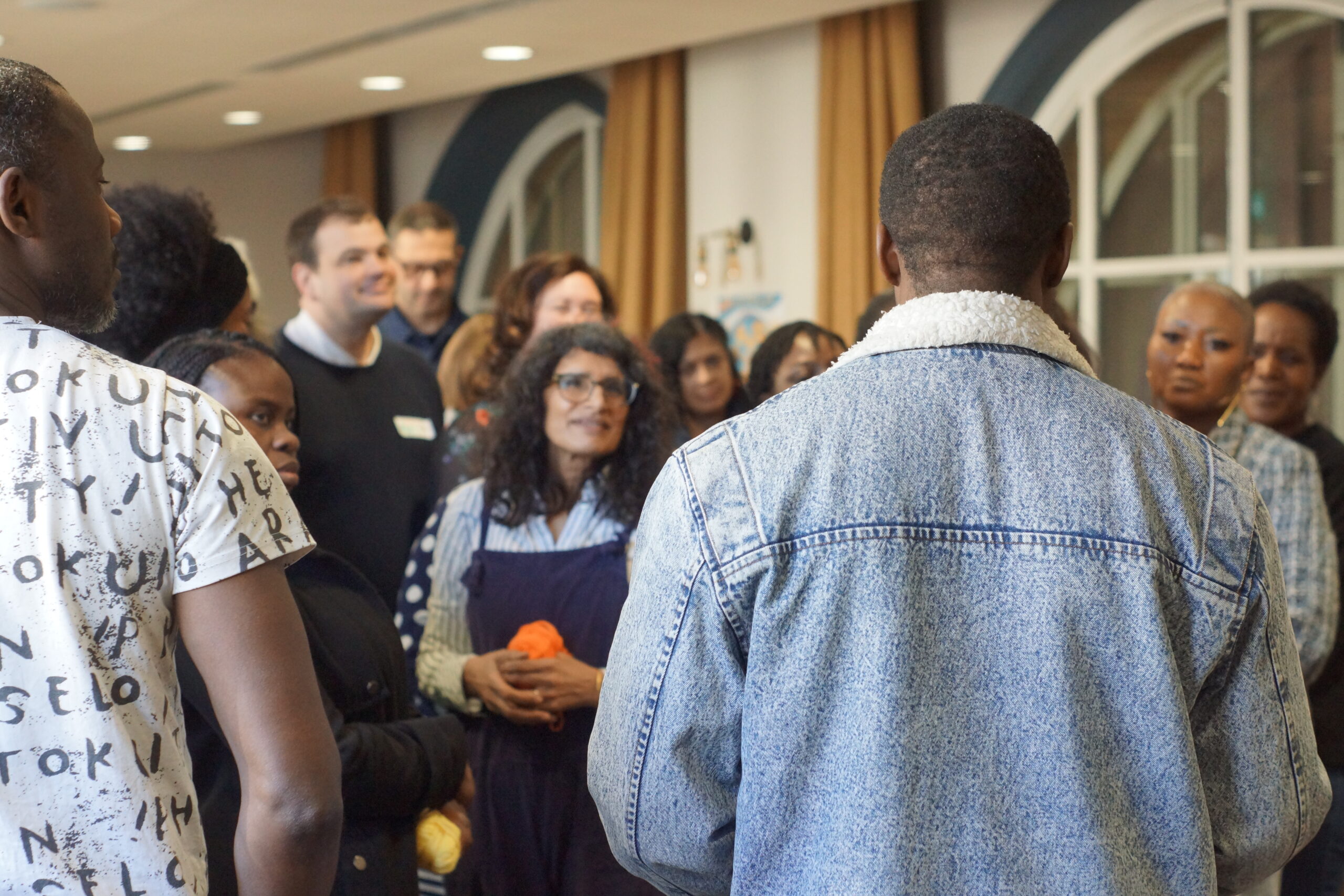
Structured entity
Key points:
-
ROUND 1
- We need a structured entity to give us a foundation
- We need mutual accountability
- An entity that enables money to come in
- We want inclusivity and choice
- It helps us to be specific about who leads eg lived-experience
- Fluid ecosystem that can be collective and independence
-
ROUND 2
- Agility of a mission statement based on current context
- Alternatives to money, ie skills sharing as a formal currency to sustain communities
- Distributive leadership based on trust
- Monetise lived and learned experience
- Registered entity
-
ROUND 3
- Collective trust
- Delegation to each other working in smaller groups, everybody joining a working group based on skills and preferences
- Delegation to one specific group of people accountable to the wider group
- Entity needs to engage people who haven’t had a voice (volunteers, staff members, community members)
- Leading by strengths and experiences, while also sharing and teaching skills with each other
- Being able to come in and out
- Accountability to GM SC’s goals
- Decentralising CEOs and encouraging other community members to take charge in GM SC (staff, volunteers, community members)
- Creating a structure where everybody is replaceable
-
ROUND 4
- Inspired by existing entities such as (housing) co-ops, unions, decentralised networks, constituted groups
- Clear vision so people know if they want to become members
- Official paid for roles and tasks that are rotated depending on time, energy and skills
- Voluntary in-kind support, housing co-op model
- Build on lessons, models and methods so far eg circles, deep democracy, courageous conversations
- Movement building energy
-
ROUND 5
- Permanent accountability
- Creating shared knowledge, shared values and vision
- Together we are abundant
- Make the structured entity shift around the boroughs
- Creating mutually respectful challenges for each other
- Out of conflict comes creativity
- Change is inevitable, growth is optional
Questions (organised in categories):
-
Governance
- Do we want to have a structure?
- Do we want to have a constitution?
- Do we want to be a constituted group?
- Do we want to be a legal structure?
- Do we want to become a registered entity?
-
Membership
- Do we have members?
- Do you need to be an existing partner to be a member?
- Does everyone have the capacity to be hands-on in building what comes next?
- Do we want to decentralise CEOs and directors to involve employees, volunteers, and community members in running GM SC?
- Do we want the model to be informed by those whose voices haven’t been heard? (i.e. employees, volunteers, community members)
- Do we want to value in-kind support, as well as money/physical support (when it comes to membership)?
-
Decision-making
- Do we need to be specific about who leads it?
- Do we need to be agile?
- Can we find a power-sharing model that would work for GM SC?
- Do we need to create our own alternative power-sharing model?
- Do we need to be all involved in decision-making?
- Do we want to have a distributed/shared leadership structure?
- Do we want to have permanent accountability?
-
Roles & responsibilities
- Do we want everyone to be involved in working groups?
- Do we want to devolve responsibilities to smaller groups?
- Do we want to devolve responsibilities to a specific group of people?
- Do we want to have specialised roles delegated to specific staff members employed by GM SC where needed?
- Do we need to identify our areas of speciality?
-
Employment & finances
- Do we need employees [to run GM SC]?
- Do we want everyone who has a specific role in GM SC to be paid a universal living income?
- Do we want GM SC to have a bank account?
- Do we want to keep any financial assets within Social Change Nest?
- Do we want to be a fiscal host (i.e. Social Change Nest)?
- Do we want to continue using an external fiscal host (such as Social Change Nest)?
- Do we want to invest (green/ethically)?
- Do we want to monetise lived and learned experiences?
-
Sustainability
- Do we want to develop a structure where everyone is replaceable?
- Do we want the structure to allow people to dip in and out?
- Do we want to create a structure that supports the passing and sharing of skills?
-
Relationship with others
- Do we want to [actively] engage with the external system?
- Do we want to be able to challenge, in the name of GM SC as a whole, on behalf of the individual membership organisations, on particular/specific issues?
-
Values, mission and vision
- Do we want to have collective values?
- Do we need to consider revisiting our collective mission based on current contexts, such as external political, ecological, social, technological, and personal contexts?
- Do we want to value lived and learned experiences?
- Do we need to have a shared understanding of what is needed, to build our collective vision?
-
Physical community space
- Do we need a physical space?
- Do we want a commune?
- Do we want the commune to be closed off from the rest of the world?
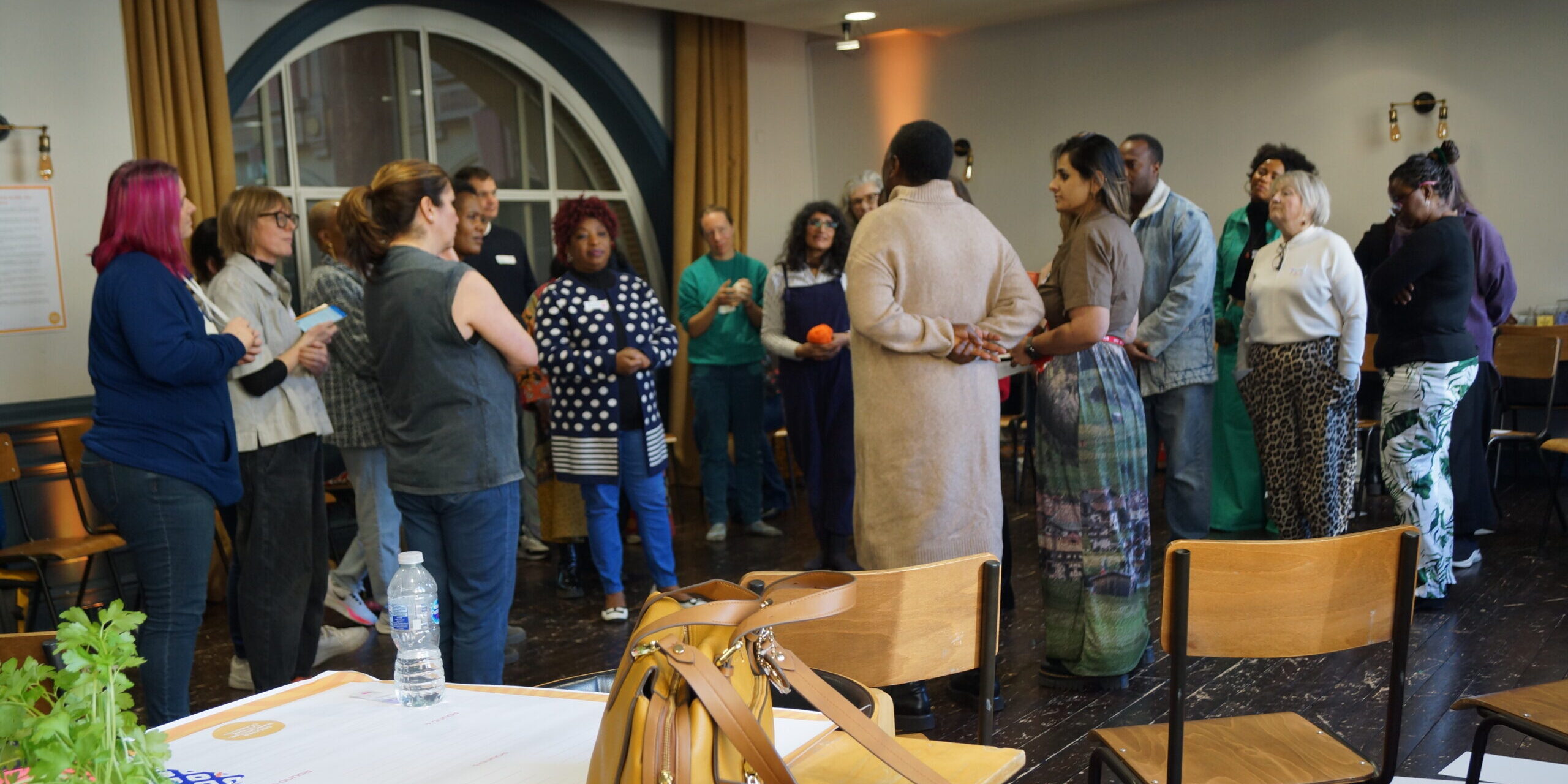
Community ownership
Key points:
ROUND 1
- Virtual space to lead into physical space
- Multipurpose community space that is sustained by the community that uses it
- Green space
- 10 common spaces in each GM borough OR utilise existing space that belong to partners
- Collectively own
- anti-oppressive values
- office/shop/cafe/event garden etc
ROUND 2
- Eco friendly space that has healing in the core
- Acknowledging intersectional traumas experienced (past & present) by the community and equally organisations + reach + community ownership
- Embeds healing those traumas in an open and transparent ways
- Including hidden voices, enabling spaces ownership
- Understanding the knowledge and skill of our communities, owners
- Developing community competencies
ROUND 3
- Who is/are the community?
- We don’t want a ‘newly’ owned (by us) physical space
- How do we opt in, should we be member based?
- Create a franchise model and a test-bed for how we work in different spaces
- Offer multiple spaces that already exist
- The community is around temporarily shared physical spaces owned/controlled by members
- Can be an organising space to support actual community asset development
ROUND 4
- The land trust model – we will create this model which holds the assets of the community perpetuity
- Centralised skills – e.g. towards building ownership
ROUND 5
- Start with existing collectives – islands of sanctuary/neighbourhood based/asset transfers
- Owned truly by community (not a few individuals)
- Land trust/commons – not more capitalism
- Needs to be rooted in justice and liberation
- Learning from other sides of liberation & each other (for contrast and clarity)
- Consider land for housing and food justice – one place for all us, a back up (e.g. land with temporary community)
Questions, reorganised by themes:
-
What kind of space we might want
- Do we begin the process with first having a virtual space?
- Do we need a green space?
- Do we need one in each borough?
- Do we want one central space?
- Do we want it in the city or outskirts?
- Do we want to use existing spaces that belong to GM SC partners?
- Do we use and expand existing spaces in the GM SC network?
- Do we want to have an office, shop, café, garden, event space—or all of these?
- Do we want to replicate the same model everywhere? (or have some that are only office, only shop, only café, or a combination of 2 or 3, etc)
- Do we [want to] acquire new spaces?
-
Ownership
- Do we want collective ownership?
- Do we want one person to be responsible for the space(s)?
- Do we want the community to be responsible for each space?
- Do we want to focus on supporting existing collectives to have community ownership?
- Do we want to support the development of community members to become owners?
- Do we want the person accessing the resource to be the same person as the community owner?
- Do we want to have an understanding, skill set, and knowledge of prospective community owners?
- Do we want to be membership-based?
- Do we want a system for people to opt-in (to be part of the community)?
-
Sustainability
- Do we want the community to sustain it?
- Do we want the spaces to be eco-friendly with a nurturing environment?
- Do we want to buy land for housing and food justice?
- Do we want a space that is sustainable for generations?
- Do we want to do both short-term and long-term action?
-
Values
- Do we want to agree on anti-oppressive values to respect in the space?
- Do we want to offer mutual and free access into the multiple spaces that already exist (i.e. members are already using)?
- Do we want to be intentionally active in reaching excluded people/hidden voices? [in relation to having a physical space]
-
Islands of Sanctuary
- Do we want to focus on islands of sanctuary?
- Do we need to define what is an island of sanctuary (who can qualify as one)?
-
Strategy & relationship
- What’s the strategy for doing this?
- What is the relationship between the organisations and the GM SC network?
Building alternative systems
Key points:
ROUND 1
- Bringing ancient wisdom back
- Healing and holistic
- Mutuality
- Imagine if…
- Collective goals
Round 2
-
- Name and get rid of the capitalist system that keeps people in scarcity, feeling in permanent competition.
- Whilst we are doing this, create a space we can temporarily step into, our alternative space where we share, learn and grow our alternative.
- Leaving no-one behind
- Clear we are doing this because it’s our individual and collective interests.
- Address our basic necessities.
- Share our ancient/modern wisdoms through communication , share our different cultural frameworks that have/exist and that can thrive.
- Fundamentally it’s a class struggle, how do we get our power back?
Round 3
- Alternatives are truly what hidden voices need/want
- Exchanges and share – resources, skills, ideas and information.
- Experiment with alternatives and integrate feedback.
- Share examples and possibilities to inspire and inform others.
- If we have or learn something, share it on – personal responsibility.
- Make sure what we do reaches grassroots & isolated individuals.
Round 4
- Identify what is not working for us – eh. Food provision, housing, money, education, health, welfare
- Create a dreaming space outside of the norm
- Needs meaningful representation
- New systems will be accessible, non judgemental, sensitive without unnecessary bureaucracy
- Is this the new way? Or ??
Round 5
- What are we alternative to? i.e do we want to recreate the services
- Fluidity – So were always evolving the system
Questions reorganised by themes:
Our priorities
- Do we believe basic necessities are addressed within our system?
- Do we want to prioritise, e.g food and housing?
- Do we want land and food to be a priority?
- Do we want to meet our food/financial needs without money?
Our approach
- Do we need to be radical?
- Do we believe our language is too complicated and not accessible? [For who?]
- [Do we believe everyone, including those who are not interested in us, needs to understand our work?]
- Do we believe it is ok to leave anyone behind?
- [Do we believe everyone, including fascists, should be included in our work right now?]
- Do we need to create a dreaming space outside of modernity?
- Do we need to be anti-capitalist?
Vision & experimentation
- Do we want to translate our vision to attract what we need?
- Do we want to reform the current system? Or do we want to destroy it?
- Do we want to create our own system?
- Do we want to start with experimenting with alternative ways of existing?
- Do we want to experiment and trial new systems?
- Do we want to identify what is not already working?
- Do we want to identify the skills needed to build new systems?
- Do we want to go where the energy is?
Thriving
- Do we want to get our power back?
- Do we understand what prevents us from thriving?
- [Do we want to communicate on how to thrive?]
- Do we believe we know enough now, between us, to begin to communicate how to thrive?
External engagement
- Do we want other movements/organisations (with similar goals) to challenge us?
- Do we need meaningful representation in the current system?
Resources and governance
- Do we need a digital space of resources?
- Do we need specific roles? Do we want to name them?

GMSC forums: key points and questions from the 13th of March
On the 13th of March 2025, partners who couldn’t attend on the 6th met loneand decided to have discussions related to the future of GM SC, around the following 3 tables/breakout rooms for the World Café: Wealth: redistributing + ownership, Practice space for learning & unlearning, and Healing, rest & well being. In the discussion, the following themes also repeatedly came up:
- the need for money while also our connections existing beyond money,
- shifting from scarcity and competitive mindset to collaboration and abundance mindset,
- the need for space to learn and unlearn together,
- the need to care for one another and heal together,
- and moving beyond traditional systems to experiment with new more just ways of being together.
Below are the notes and questions from the 3 rounds of World Café. Please note that the notes and questions do not reflect the views of everyone involved in GM SC, they are simply things that have emerged from collective discussions.
Wealth: redistributing + ownership
Key points from the World Café discussions:
ROUND 1:
- Ownership has to be transferred – we as org leaders have that at the moment, but bringing people along to discussion will be a way of sharing that and influence redistribution
- Financial support to be able to create model for future organisations to follow
- We need to bring other community groups in to ths, it is our responsibility to bring them in (bridging) collective voice will help with ownership
- It is currently very hard to fund single organisations – make life easy for everyone who needs funding, same model of how Lankelly funded
- Be an endorsed trusted network, almost a benchmark for funders to know their legitimacy
- We are adding to the growth of the GM region also
- Bills are really important, money is powerful, we need income
- Money and capital needs to fund the breathing space for us all
ROUND 2:
- Trust based redistribution is harder than initially seemed. The bigger you get, the less you are likely to know other people and have same kind of assurance that the money will be spent within the guiding principles that were talked about earlier
- Parallel, we dont want this to be exclusive and inaccessible – but we need some kind of process, without becoming a funder
- Would love to be in the space to not think about money, but there are bills and mortgages and rent
- Problems with over capacity
ROUND 3:
- We will find what we need here – whether funding, connections or friendship (sense of belonging) having somewhere to go indicates it is working (needs are being met)
- Main thing is that funding can help us flourish but there are other things that can make us values -funding can keep us going for a few years – but if we dont feel a sense of belonging, we are living in a bubble and a sense of stuckness – more valuing a sense of connection and value
- Valuing each other beyond money – multiculturalism, education etc
Key words: redistribution, trust, financial sustainability, and alternative value systems
Questions to consider for collective decision-making:
1. Partnerships & community
- Do we want to put ‘partnerships’ in there?
- Do we want to involve partners in discussions about funding, and what is available?
- Do we want to build a better community where everyone feels they belong and are valued?
- Do we want to find what we need here? (E.g. connection, friendship, sense of belonging)
2. Membership
- Do we want to include more people?
- Do we want to include more organisations?
- Do we want to put a cap on the current number of orgs/people involved? (So we can work with the care we intend)
- Do we believe we will lose ‘trust’ if we extend the group?
- Do we want to decide today how would extending the group work practically?
- Do we believe that trust and assurance are mutually exclusive?
- Do we believe that trust and assurance can hold hands?
3. Values beyond money
- Do we believe money is a help in stepping into the big collective dreaming?
- Do we believe money is a hindrance in stepping into the big collective dreaming?
- Do we believe it is vital and necessary to pay our bills and have the basics covered?
- Do we want to be inclusive and radical?
- Do we want to find ways to value multiculturalism and other values beyond money?

Practice space for learning & unlearning
Key points from the World Café discussions:
ROUND 1:
- Being accessible to people – not being elitist, not being high brow, not being exclusive, be open and inclusive to all.
- Concerns about competitiveness in the room, scarcity of resources have created a grab for money and lack of trust with each other.
- Shifting the value to ensure we collaborate and grow together
- Encouraging shared resources and shared experiences
- Links through to the healing spaces: reflect and heal from experiences in community spaces
- Unlearning will be the challenge – do people unlearn when people feel safe?
- Spaces become real – lived experiences create authenticity from the attendees
ROUND 2:
- Previous mention of having a membership
- Sharing resources – case studies etc,
(CultureBridge) encouraging their community to collaborate – finding a resourceful space – migrant artists who are having to take on other jobs instead of practising their art… - Lack of information/data around migrant creatives (in Stockport)
- Share resources and knowledge to help with projects – funding bids and project management
- Recognise other ‘talented individuals/groups’ outside of our circle…
- Collective visibility – sense of belonging
- Support others who may struggle working in isolation
- Social value of being connected to others (especially for migrants)
ROUND 3:
- Survival mentality – we are still part of the capitalist system
- Learning to be comfortable being uncomfortable around money. Money is NOT dirty, its people that make it dirty!
- Unlearning not to be reliant on one system – create an ecosystem to help the community
- Learning who community members who are ‘experts’. Finding the space to create that sharing.
- Unlearning how we share – keeping things to ourselves…
- A big disconnect with smaller communities – encourage a sharing of tools to help support them
- We are destroying old ways of being – our past – to become…NEW WAY OF BEING
Questions to consider for collective decision-making:
1. Inclusivity & membership
- Do we want to make our spaces more inclusive?
- Do we want to have a membership scheme?
- Do we want to further celebrate cultural identities together?
2. Resource sharing
- Do we want to commit to a shared experience through shared resources?
- Do we believe we need to be in the same shared space to experience what others are dealing with?
- Do we want to better support ‘eco-systems’ members/spaces?
- Do we need to experience what others are dealing with?
- Do we want to share funds equally?
- Do we want to fund and allocate these ‘spaces’?
- Do we want to get funding to help sustain a ‘space’ for creatives (from a multi-cultural community/refugee communities)?
- Do we want to work together on funding bids?
- Do we want to support community leaders further by funding respite for frazzled leaders?
3. Knowledge sharing
- Do we want to share our ‘useful contacts’ with each other fully?
- Do we want to gather further data about the location of migrant artists in the area?
- Do we need to bring into the wider group those who are in the ‘layer’ below our GM SC experts?
- Do we believe there are GM SC experts?
4. New ways of being
- Do we want to focus on unlearning the competitiveness?
- Do we want to avoid being gatekeepers ourselves?
- Do we want to do this collaboratively, involving the collective?
- Do we want to identify what we are ‘becoming’?
- Do we want to practise NEW ways of being?
- Do we believe we hold a certain frustration in trying to practice something NEW?
5. Physical & digital spaces
- Do we want to create a platform for community members? (LinkedIn-style?)
- Do we want to use existing spaces across, or with GM partners?
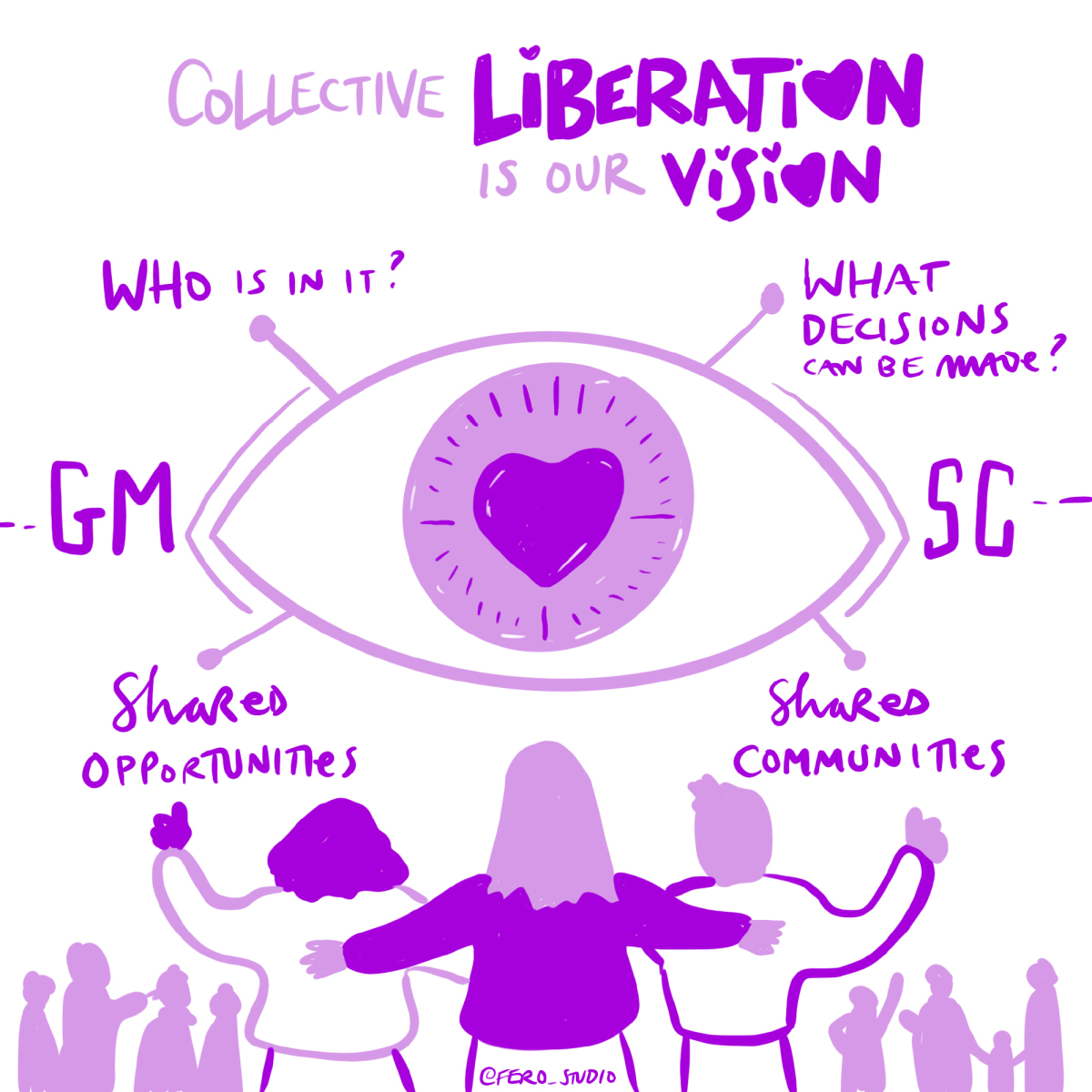
Healing, rest & well being
Key points from the World Café discussions:
ROUND 1
- Funding to increase capacity and wellbeing
- Encourage everyone to continue their work
- Connect with each other, to learn together
- Continue as a space to educate and stand with each other
- Access to therapy and relaxation for everyone (massage or talking) for community, volunteers, staff and directors
- Space to talk and share ideas
- Retreat to connect, relax and rest
- Sharing existing skills and resources within GM SC
- Directory of resources and culturally relevant people and services
- Childcare
- Space for face-to-face connection
ROUND 2:
- Who takes care of the carers? Retreat type of activities, not focusing on work, able to relax and detox and leave feeling replenished and understanding one another more
- A safe space to be vulnerable, losing preconceptions or pre-judgements
- Accountability, able to check-in with ourselves and practice enough self-care and look after ourselves. Don’t wait until crisis point.
- Be able to bring the participants/communities/people we work with along to the space
- Embedding a common sense practice
- More resources to provide childcare and food for meeting and breaking down barriers and valuing people’s time, recognising their contributions as work
- Collective care at a wider scale and taking collective responsibility for this
ROUND 3:
- Training in understanding and responding to trauma. How to not let the trauma others are experiencing overwhelm you
- Keeping our own responses boundaries and contained
- The freedom to choose what your healing is, e.g. being offered counselling from local authority, might not be the best response and we’d like more autonomy in deciding what our healing is
- More developed support networks for public services and commissioned services and less so in community-led spaces
- Knowing what choices and options are out there and making sure these are appropriate to community-led spaces
- A resource for emerging community leaders/activists around healing, rest and wellbeing. Including role-modelling how not to just say yes to everything. Re-assurance you can say no and it won’t mean that you will fil if you do
- Understanding what is involved in setting up charities/community spaces and the demands. Videos or podcasts around this so people can make informed choices
Questions to consider for collective decision-making:
1. Funding
- Do we want to apply for funding together?
- Do we want GM SC to be a funding body?
- Do we want someone else to apply for funding for GM SC?
2. Community
- Do we want to stay in community?
- Do we want to continue learning together?
- Do we want to continue sharing our experience and cultural background?
- Do we want to share skills and resources internally to contribute to the wider network?
- Do we want to create a directory of resources and culturally relevant people and services?
3. Wellbeing support
- Do we want to provide therapy for each other?
- Do we want to teach each other relaxation techniques?
- Do we want to pay someone to provide care for us?
- Do we want to care for the carers between ourselves?
- Do we need training to learn how to be trauma-informed?
- Do we need a space to collectively reflect on and talk through our community traumas to process them and support each other and our members better?
- Do we want to build alternatives that are trauma-informed?
- Do we want different spaces that address different needs for healing and rest?
- Do we want to create a resource library of choices and options for our communities to heal and rest?
4. Retreats & face-to-face connections
- Do we want to go on a retreat?
- Do we want to go on regular retreats?
- Do we want these retreats to be a work-free space?
- Do we want time for face-to-face connection?
- Do we want a space to be vulnerable?
- Do we want to have a space to check in with ourselves and each other?
- Do we want those check-ins to happen in a regular facilitated space?
- Do we want to organise retreat and resting space between each other rather than pay someone to do it for us?
5. Support for Partners
- Do we want to provide childcare?
- Do we want to provide childcare for partners’ members?
- Do we want to provide food for partners’ members?
- Do we want to create something to support future people who are going to do this work? Ie do we want to be elders?
- Do we want to support people interested in starting a project, to join an already existing group, instead of starting from scratch?
- Do we want to abolish centralised leadership?

